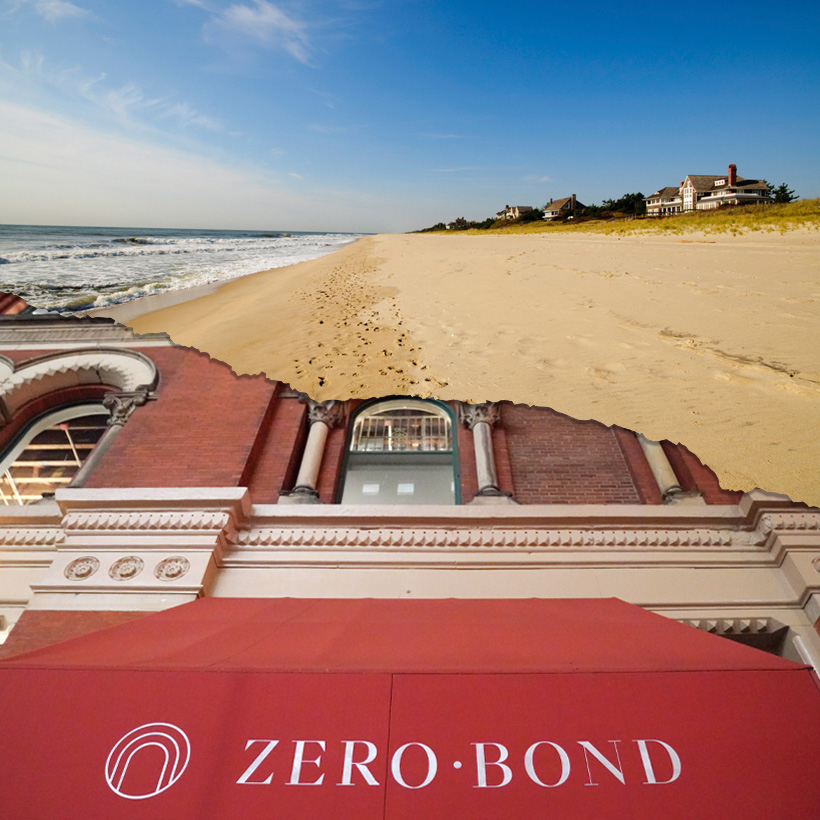Last week, at a village board meeting in East Hampton, Kenneth “the Lip” Lipper, a resident of the village and former deputy mayor of New York City, delivered a jeremiad against the coming scourge of movie actors, socialites, and sports stars—with their “entourage of hangers-on, drivers, bodyguards, and, of course, the ever-present paparazzi”—to Main Street.
The rumored leasing of the historic Hedges Inn, with its 13 guest rooms and white picket fence, to Zero Bond, an exclusive members-only club with locations in Manhattan and Las Vegas, was a personal affront to Lipper, 82, whose house on Hook Pond Lane abuts the property. Counting Tom Brady, Kim Kardashian, and current New York City mayor Eric Adams among its members, Zero Bond has become the latest flash point in the ongoing battle between developers and preservationists on the East End.

Distaste for luxury brands and their city-slicker clientele are nothing new in East Hampton, where high-end boutiques now occupy what were once mom-and-pop shops. As far back as 1996, The New York Times ran a story on the summer destination with the headline Residents Gripe That Their Hideaway Has Become Too Much Like Beverly Hills. East Hampton is already home to a number of big names—Ina Garten, Jerry Seinfeld, and Paul McCartney, to name a few—although they tend to live quietly behind towering hedges, spotted occasionally at farm stands, bakeries, or the beach.
Nevertheless, the arrival of “the Zero Club,” as the Lip called it, “would change the very character of the village.” The increased noise and traffic would displace the nervous swans of Hook Pond, he said, and replace them with “a permanent encampment” of the V.I.P.-industrial complex.
The Lip was met with applause from other concerned citizens, gathered by the dozen for the hearing on the issue. Most, it seemed, were there to support new legislation meant to stop the inn from becoming a public nuisance. Even without out-of-town chauffeurs and hawkish photographers, the Hedges, which is situated on a sharp turn in the road, has already been the site of eight traffic accidents over the past decade. The inn is still making repairs from a crash in January when a sedan full of teenagers barreled through its front porch.

Introduced by Mayor Jerry Larsen, the proposed new law would amend the village code to prohibit businesses in its historic districts from taking food or beverage orders between 10 p.m. and 6 a.m. This would chiefly affect the village’s five historic inns: the Huntting Inn, 1770 House, the Maidstone Hotel, the Baker House 1650, and the Hedges, and put a damper on any all-night extravagances planned by Zero Bond. In a village with already stringent, and regularly enforced, noise codes—last summer, a woman on Pleasant Lane called the police about a sound that turned out to be the ocean—such an amendment would render Zero Bond impracticable in East Hampton.
Opposing the new legislation at last Friday’s hearing, attorney Christopher Kelley, representing the Hedges, deemed the village proposal “a solution in search of a problem.” Kelley, who pointed to a complete absence of “rowdy behavior” from the various inns, argued that the amendment did not have a reasonable basis and was therefore unconstitutional. He went even further, claiming that under the proposed legislation, the rector and acolytes at St. Luke’s Episcopal Church could be jailed for serving Communion wine at Midnight Mass on Christmas Eve.
Meanwhile, Richard Whalen, the attorney for Patricia and Peter Handal, neighbors of the Hedges on nearby James Lane, commended the village trustees for proactively handling an issue they have “both the power and the responsibility to regulate.”
Last summer, a woman on Pleasant Lane called the police about a sound that turned out to be the ocean.
This is not the first time that the inn has tussled with the village elders. In 2021, the Hedges brought a lawsuit against the village’s prohibition on inns holding special events outdoors and in tents. The lawsuit alleged that the Hedges had been illegally targeted by a spot-zoning law “designed to benefit a single property owner,” the Handals, who regularly complained to the village board about traffic and noise from weddings at the inn. The lawsuit made it all the way to the New York State Supreme Court, which struck down the provision. (Back then, a newly inaugurated Mayor Larsen told The East Hampton Star that the ban, enacted by a previous board, “should have never been done to begin with,” adding that the village could be liable for the inn’s lost revenue.)
The day after the hearing, in a phone call with Air Mail, Kelley called the mayor’s attempt to “over-regulate” the Hedges Inn “ironic.” He noted that Larsen “has promoted himself as pro-business and is appreciated in the village for that pro-business attitude.”
Appreciated by some, that is. Since his 2020 mayoral campaign, funded by several billionaires and high-end real-estate developers, Mayor Larsen has been criticized by certain year-round residents as a shill for “city people” who have no interest in keeping East Hampton quaint. Indeed, Larsen’s private-security firm, Protec Security Services, which he started in 2005 while serving as chief of the East Hampton Village Police, counts many of the city’s high rollers as his clients, not least former Revlon boss Ronald Perelman, whose estate spans 57 acres on nearby Georgica Pond.
And so, Larsen’s commitment to regulating inns such as the Hedges came as something of a surprise. In the East Hampton Village Civic Coalition, a Facebook group that has criticized the mayor’s controversial overhaul of the volunteer-ambulance association, an anonymous poster urged residents to back Larsen’s efforts to keep Zero Bond out of East Hampton.
“Do I support business? I certainly do. But not to the detriment of the residents,” Larsen tells Air Mail. At Friday’s hearing, Courtney Garneau, a longtime resident of the area, worried that her community would lose access to the Hedges as “a place for our local kids to work, for our local families to enjoy,” if it turns into a private club run by outsiders.
But some have questioned the true motivation behind Larsen’s resolve, wondering if he is trying to protect Jenny Lilja, the innkeeper at the Hedges and the wife of village administrator Marcos Baladrón. It has been suggested that should Zero Bond bring in its own management team from the city, Lilja, who has worked at the inn for more than a decade, could lose her job. Larsen dismissed such rumors as unfounded, telling Air Mail that Lilja’s position “does not influence the board in making decisions to protect its residents.”
In any case, the proposed legislation began percolating in October, Larsen says, long before Zero Bond had entered the picture, as a means of addressing the larger trend of city-based hospitality brands taking over local inns. The 150-year-old Maidstone Hotel is now managed by LDV Hospitality, which runs Scarpetta in Manhattan’s NoMad neighborhood. (Its Montauk outpost at Gurney’s, a seaside resort and saltwater spa, is already loved by influencers and Bravolebrities alike.) Meanwhile, Texas billionaire Tilman Fertitta’s hospitality group Landry’s, which owns five Golden Nugget Hotels & Casinos and the steak-house chain Del Frisco’s, took over the Huntting Inn, and has lately been engaged in a battle with neighbors over its plans to build a swimming pool.
However, when it comes to the Hedges, Larsen is resolute in stopping Zero Bond: “If they think they’re gonna operate a late-night operation there, we’re going to certainly enforce that 10 o’clock zoning-board regulation,” he says.
Those representing the Hedges insist the space will not become the late-night blight East Hamptonites fear. (Zero Bond did not respond to Air Mail’s request for comment.) Last week, Kelley described the venture as a low-key “supper club,” and had previously cited Zero Bond owner Scott Sartiano’s desire to purchase the house next door as a testament to his good faith. In fact, with the exception of Montauk, where Bounce Beach offers weekend revelers prickly-pear margaritas and espresso martinis until two a.m., the East End is not exactly a haven for nightclubs. Even in Southampton, where “P.R. power girl” Lizzie Grubman once backed her father’s S.U.V. into a crowd outside the Conscience Point Inn, the club scene is a shadow of its former self.
Perhaps the Hedges will come to resemble what it was in the 1950s, when Le Pavillon’s Henri Soulé served Marilyn Monroe and Joe DiMaggio lobster dumplings and fruits rafraîchis on the bucolic property. If not, the mayor says he is willing to go to court, with trusty Ken Lipper offering his services as amicus curiae.
Carrie Monahan is a Brooklyn-based writer and producer


